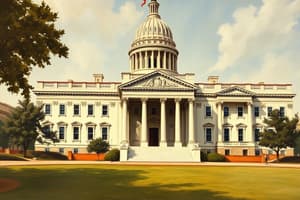Podcast
Questions and Answers
What is the purpose of checks and balances?
What is the purpose of checks and balances?
So no one person or group would seize power and control over the American government.
What are the most important checks and balances? (Select all that apply)
What are the most important checks and balances? (Select all that apply)
- The judicial branch can check both the legislative and executive branches by declaring laws unconstitutional. (correct)
- The executive branch can check the legislative branch by vetoing laws. (correct)
- The executive branch can unilaterally change laws.
- The legislative branch can check the executive branch by passing laws over the veto by a 2/3 vote. (correct)
What other checks and balances does the executive branch have over the judicial branch?
What other checks and balances does the executive branch have over the judicial branch?
The president appoints all federal judges.
What other checks and balances does the legislative branch have over the executive branch?
What other checks and balances does the legislative branch have over the executive branch?
What other checks and balances does the legislative branch have over the judicial branch?
What other checks and balances does the legislative branch have over the judicial branch?
How can the Senate and House of Representatives check each other?
How can the Senate and House of Representatives check each other?
What are checks and balances on the people? (Select all that apply)
What are checks and balances on the people? (Select all that apply)
What is the theory of federalism?
What is the theory of federalism?
What are enumerated powers?
What are enumerated powers?
What are implied powers?
What are implied powers?
What are reserved powers?
What are reserved powers?
Flashcards are hidden until you start studying
Study Notes
Purpose of Checks and Balances
- Prevents any individual or group from gaining excessive power in the American government.
Key Checks and Balances
- Executive to Legislative: The President can veto laws passed by Congress.
- Legislative to Executive: Congress can override a presidential veto with a two-thirds majority in both chambers.
- Judicial to Legislative and Executive: The Supreme Court can declare laws unconstitutional, checking both branches.
Executive Branch Checks on Judicial Branch
- The President has the authority to appoint all federal judges.
Legislative Branch Checks on Executive Branch
- Congressional approval is required for presidential appointments.
- The Senate must ratify treaties made by the President.
- Congress has the power to conduct investigations of the executive branch.
- Legislative branch holds impeachment power over all federal officials.
Legislative Branch Checks on Judicial Branch
- Congressional approval is necessary for the President’s judicial appointments.
- Legislative branch retains impeachment authority over federal judges.
Interaction Between Senate and House of Representatives
- The Senate and House can block each other by rejecting proposed bills.
- The House specifically has the sole authority to initiate revenue bills.
Checks and Balances on the People
- The President is indirectly elected through the Electoral College, not directly by the populace.
- Only one-third of the Senate is elected during each election cycle.
- Federal judges are not elected by the public.
Theory of Federalism
- Describes the division of power between national and state governments.
Enumerated Powers
- Specific powers granted to the federal government as outlined in the Constitution.
Implied Powers
- Congress has the authority to enact laws deemed "necessary and proper" for executing its responsibilities under the Constitution.
Reserved Powers
- Any powers not specifically assigned to the federal government by the Constitution are reserved for the states and the people.
Studying That Suits You
Use AI to generate personalized quizzes and flashcards to suit your learning preferences.




